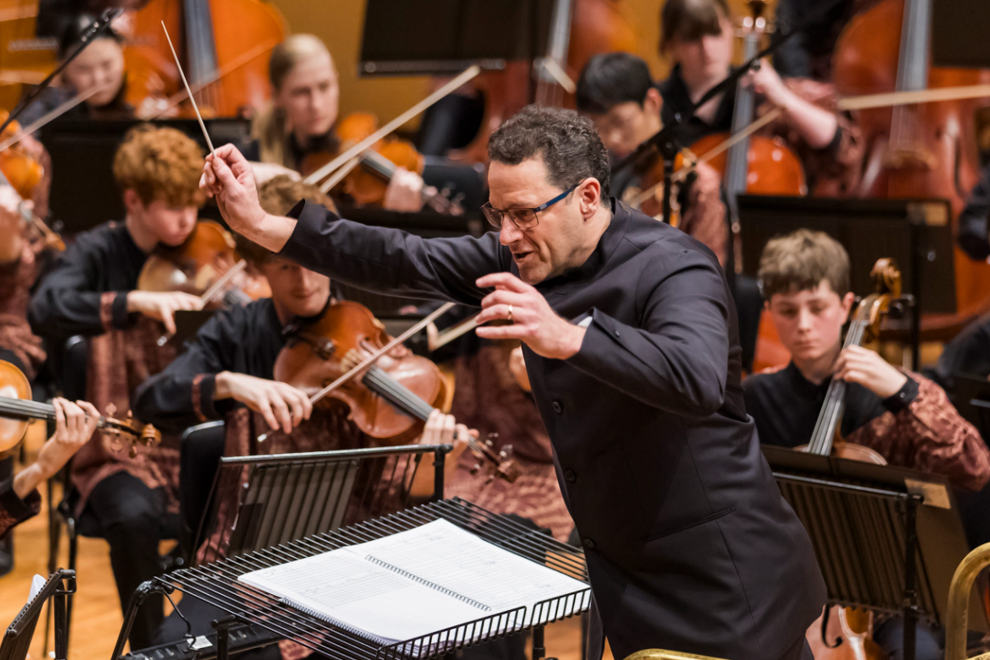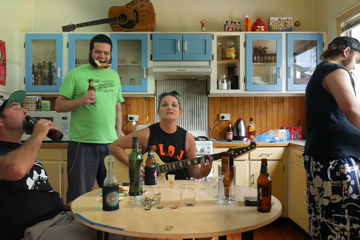You don’t necessarily think of Brisbane as the classiest city. In fact, Queensland is known for its ocker, larrikin, and (sometimes) trashy ways. But that isn’t exactly the case, according to renowned conductor Simon Hewett.
“It’s easy to believe some of the schtick about Queenslanders somehow being bogans or uncultured.” Hewett tells The Music. “But for a very long time, Queensland has produced young instrumentalists who are incredibly talented. Just as everybody knows that Queensland produces great swimmers, we should be equally well known around the world as a place that creates good musicians, because we have the system in place that already contributes so much towards that.”
A key component of that system is Queensland Youth Orchestra (QYO), an organisation that provides orchestral training and instrumental training to the best and brightest young musicians in the state… Or, as Hewett calls it, “a nursery for the whole musical ecosystem”. After all, he runs the competitive program, working as the Artistic Director for the company - which actually came as a full circle moment for the QYO alum.
Despite being in high demand overseas - La Scala, the Hamburg State Opera, and the Stuttgart Opera are just some of the companies he’s conducted for - Hewett’s Europe adventures took a backseat for a return to the homeland. And he only had eyes for one role when he got here.
Don't miss a beat with our FREE daily newsletter
“I'd often said to Maria, my wife, if there was one organisation in Australia I would dearly love to play a role with, it would be QYO - because the music nerds like me, they come to QYO and they find their tribe. They find like minded young musicians. And for me, I get to be music nerd in chief and introduce them to all the stuff that I fell in love with as a kid. And, yeah, it's the most fulfilling thing that I do.”
Going through the QYO program himself as a child, Hewett knows all too well the impact music education can have on developing minds. And he also knows how coming from Queensland can lend itself to insecurities for people within the classical space. Thus, his mission is clear: to make Queensland a hub for burgeoning classical musicians.
“The kids that come to QYO, they're extraordinary. And all I want to give them, really, is a sense that they're as good as anywhere else in the world. When I started working at some of these old places in Europe, I definitely had a bit of imposter syndrome. You know, what's a kid from Indooroopilly able to tell the Vienna Philharmonic or whatever? But I think I've learned to be a little bit more comfortable in my own skin, so I just want to help provide some connections to those young musicians who are really thinking of a career in music - but also just advocate for music in the community.
“Kids who are exposed to music education from an early age, they just do better at everything. They're more empathetic, they're better at languages, they’re better at maths. It's no coincidence that your musicians in any school often tend to do well academically as well. And that's because music just has an incredibly positive impact on the developing brain. And I don't think that's as well understood as it needs to be.
“I think everybody has a sense that kids playing sport is good because, you know, ‘healthy body, healthy mind’, but the lifelong benefits of a musical education, it’s just so much more than music. It’s so much more than just training as a musician. The structure of your brain is set up differently, and that wires you in a way that is going to be more useful for you later in life. So I just want to make sure that the Government and all other stakeholders understand that, and if anything build out even more music, education, structure and capitalise on the vision that we have here in Queensland.”
Hewett isn’t just hoping that more children get into classical music. He’s also rooting for adults to get past the perceived elitism that has often shrouded orchestral music with an air of exclusivity.
“Classical music became a sort of an exclusive club in the 20th century, which I think was really regrettable,” he says. “The more you read about composers like Mozart or Gustav Mahler, they were so earthy, you know? They were roots musicians. They were using folk melody, popular music of the day, and weaving that into their compositions. There was nothing aloof or elite about them at all. And I think people who think of classical music as this sort of fusty, austere, inaccessible world, perhaps just haven't had the time or the opportunity to sit down and have someone introduce them to it in an easy, relaxed way.
“Genres are a little bit like a comfort blanket. We tend to stay with the stuff we know. But the ironic thing is that, actually, everybody has an emotional relationship to orchestral music, whether they know it or not, because we all go to the movies, right? So if you go to the movies, there's always orchestras - not in every soundtrack, but in most of them. Composers have been using the vocabulary of classical music, essentially, to manipulate us in good emotional ways in movies since movies were first made.”
One of the most recognisable cinematic scores? That of the Star Wars universe. So, what better way to introduce newcomers to classical music than John Williams’ iconic The Empire Strikes Back Symphonic Suite?
As such, under the wing of Hewett, the Queensland Youth Symphony is set to broaden your musical horizons on May 31, performing that soundtrack alongside Liebermann’s dramatic and romantically charged Flute Concerto, and William Walton’s Symphony No. 2. And, according to Hewett, it’s not to be missed.
“Our principal flautist, Nathan Smith, is playing a flute concerto - he's an astonishing flautist. He can do things that you didn't think were possible on the flute. So, yeah, come to our concert.”
Simon Hewett and Queensland Youth Symphony’s ‘Empire of Sound’ is set to take place on May 31. Find tickets and more information here.
This piece of content has been assisted by the Australian Government through Music Australia and Creative Australia, its arts funding and advisory body

















